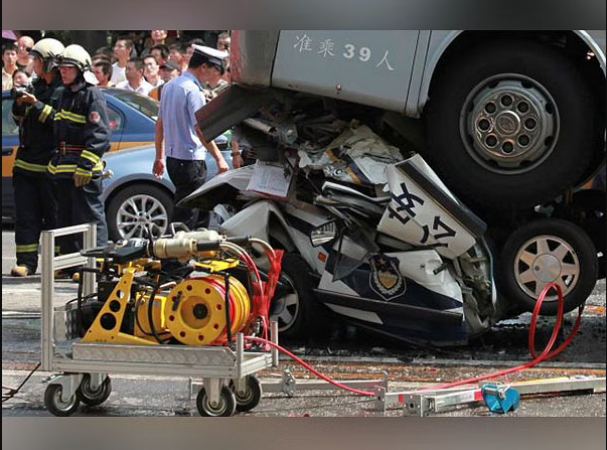
BEIJING: Anger over strict COVID-19 measures in China reached a new peak on Sunday when a bus carrying people from the southern city of Guiyang to a quarantine center crashed, killing 27 and injuring 20.
On Sunday night, Guiyang Vice-Mayor Lin Gang apologized for the accident, which occurred shortly after 2 a.m., as the bus was on its way to the mountainous County Libo, about 260 kilometers (160 mi) from the city.
He did not elaborate on the government's role in the accident or the reason for the apology. Lin said instead that the government would "observe the security risks in taking people into quarantine" as well as investigate the cause of the incident.
The Guizhou provincial government announced on Monday that three officials from the Yunyan district of the bus victims had been suspended from duty pending an investigation.
The officers are Zhu Gang, District Communist Party Secretary; Song Chengqiang, who was in charge of relocating the residents; and Xiao Lingyun, Yunyan's Party Deputy Police Secretary.
According to an unnamed official, the province and city are investigating the accident and those responsible will face punishment.
However, the apology and suspension had little effect on the outburst of anger, with more than 69,000 comments on social media and related topics on microblogging site Weibo garnering more than 400 million views in the 24 hours following the accident.
The level of social media engagement on the same issue matches the response in February 2020 to the death of Li Wenliang, a Wuhan doctor widely considered an early pandemic whistleblower.
Several commentators offered their condolences to the accident victims, who were all from the same Yunyan district area where the Covid-19 cases were reported.
Some relatives of the accident victims expressed their grief and disappointment on Weibo. One woman wrote, "[My mother] has been staying at home for the past half a month and has only to do the COVID-19 test."
"She was in possession of a green health code and a negative test result." He was then taken to Quarantine, where he died on the way. Such a conclusion is unacceptable to me."
Hu Zijin, former editor-in-chief of the state-owned tabloid Global Times, said the accident should be seen as a safety issue rather than linking it to COVID-19 prevention policies.
Several internet users pointed to a clear violation of national transport rules, which prohibit long-distance buses from plying on highways between 2 a.m. and 5 a.m. to prevent fatigue.
Others, however, criticized the frequent but unnecessary practice of transferring people to isolation facilities outside cities. Some people have demanded that the authorities should pay the cost of their lives and property due to their negligence.
Wilfred Wang, a media and communication studies lecturer at the University of Melbourne, observed that many online commenters, especially on Douyin, the Chinese version of TikTok, were linking their frustration with their displeasure and grief with stricter COVID-19 control rules.
"It appears that a lot of people in China had stricter COVID controls, but such sentiments are implied by either censorship or self-censorship," Wang said.
Due to strict COVID-19 measures, Beijing resident Lilian Song said she was angry and worried about the accident because "everyone could end up on the bus like this."
According to Fang Kecheng, an assistant professor at the Chinese University of Hong Kong's School of Journalism and Communication, the responses from Internet users demonstrated their concern that local policies were trampling national laws and regulations.
"However, offline protests and other mass actions are unlikely, as we saw during the Shanghai lockdown, the death of Li Wenliang, and so on." "There is a clear lack of efficacy among the general public," Fang said.
Yebin Zhou, a biomedical researcher based in the United States who writes about science on Chinese social media, said there is no scientific evidence that centralized facilities perform better than home quarantine.
"The transportation process will actually put more people at risk of infection," he wrote.
Due to the lack of isolation facilities, residents of entire buildings - or even entire residential areas - have been relocated to Shanghai, Xian and other cities in Beijing.
Officials claim that the practice improves isolation and shortens the transmission chain. It also enjoys "social clearance," meaning that all new infections are discovered in people who are already isolated.
According to an unverified leaked document, Guizhou officials had set a target of achieving "social clearance" by September 19, less than a month before the National Congress of the Communist Party.
On Monday afternoon, the Guiyang municipal government announced that no infections were discovered during three rounds of citywide testing from Thursday to Saturday, and that the risk of community transmission had been "effectively contained."
On social media, Nie Riming, a researcher at the Shanghai Institute of Finance and Law, stated that Guiyang's authorities were more concerned about the spread of Covid-19 than the safety risks of transporting people over long distances at night.
"Pandemic preventions clearly trump all other safety management policies in Guiyang, which is the cause of the crash," he wrote.
Nie stated that Guiyang was not alone, citing numerous violations in pandemic prevention policies in other cities, including those that have fenced off areas or locked people in their homes.
On Monday, a day after the crash, social media users posted pictures of rows of buses and said people were being transported to facilities hundreds of kilometres away.
Biden promises that US forces will protect Taiwan from an attack by Beijing
Hong Kong stocks slumps as Federal Reserve rate-hike recession worries
Beijing Sanctions Raytheon and Boeing Executives Over Taiwan Arms Sales